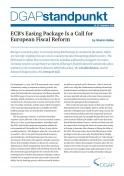On September 12, 2019, the ECB announced a new round of monetary easing in response to slower growth, low inflation, and a continuous decline in inflation expectations that had made the convergence of inflation towards the ECB’s target of 2 percent increasingly doubtful. This package, which combines a cut in the interest rate, the introduction of a tiering system to reduce the burden of the low rate policy on banks, and the open-ended resumption of the asset purchasing program, is probably the ECB’s boldest package since its introduction of Quantitative Easing in 2015.
The key question, however, is whether this policy response can be effective in the current economic context. There is, in fact, a growing sentiment, including inside the ECB, that further monetary expansion without fiscal expansion will be ineffective. Worse, it may also be counterproductive. This happens when the “reversal rate” is reached – that is, the point beyond which monetary accommodation, all things being equal, becomes contractionary. This notion rubs against orthodox monetary theory that considers inflation to always be a monetary phenomenon, which consequently means that monetary policy is always potent (albeit with declining returns). But this monetarist approach ignores the central role of the banking system in delivering monetary stimulus. Indeed, durably low or negative interest rates result in low profitability for the banking system, which eventually hinders its ability to expand credit. Moreover, a flat or inverted yield curve clogs the fundamental workings of maturity transformation and destroys the banking system’s ability to turn short-term deposits into long-term loans. We are most probably already at the point where monetary accommodation becomes contractionary unless it is matched by appropriate fiscal expansion.
This is why the growing tension on this issue inside the ECB should not be taken lightly. Indeed, unlike previous episodes of disagreement inside its governing council, the current dissent includes some who supported monetary expansion in the past, for example Banque de France Governor Francois Villeroy De Galhau and French Executive Board Member Benoit Coeuré – neither of whom can still be suspected of courting the favors of conservative voices in Europe to increase their chances of taking the helm of the ECB. This uncertainty about the effectiveness of the package is also the reason why President Mario Draghi has argued very strongly for fiscal policy to “take charge.” However, public admission by the ECB that it cannot fulfil its objective without fiscal support remains taboo for two reasons. First of all, because it would reveal that the ECB cannot meet its mandate alone and undermine its credibility. Secondly, because it would potentially endanger the ECB’s absolute independence and force greater fiscal and/or monetary cooperation than the ECB is prepared to accept.
Against this background, it is therefore critical to assess the extent to which the euro area’s fiscal stance is likely to move in response to the ECB’s package and plea. At the ECOFIN, an informal meeting of EU economic and financial affairs ministers, that took place in Helsinki on September 13–14, 2019, a discussion of possible reform of fiscal rules ended in a deadlock and none of the recommendations of the European Fiscal Board were taken up. Despite the growing academic consensus about the inanity of the debt reduction rule introduced by the Fiscal Compact, the need to free fiscal rules from unreliable measurements of output gaps and structural deficits, and the need to introduce a golden rule encouraging a minimum amount of public sector investments, finance ministers are concerned that opening the Stability and Growth Pact to debate would lead to an unpredictable outcome that they cannot afford. In the absence of reform, the European Commission will play a central role in interpreting the pact in the way that ensures the most accommodating stance. To start, it would need to stop considering the “stance broadly neutral and broadly appropriate” as it has done since 2016 because, without bolder steps, the European fiscal framework will gradually lose its relevance and coherence. The European economic governance framework will prove that it is unable to achieve the sort of fiscal coordination that is required to make a monetary union function effectively.
Germany has a particular responsibility in these discussions. Because it has consistently and loudly opposed monetary accommodation, Germany must make a clear proposal for an alternative. Such a proposal can only stem from a more open discussion about Germany’s own fiscal policy. First of all, Germany’s obsession across its political spectrum with the totem of the schwarze null needs to be challenged not only to address a strong cyclical downturn, but also to take advantage of borrowing conditions, the likes of which have never been seen before, to invest in its energy transition and infrastructure. Secondly, instead of obfuscating the debate on fiscal policy by hiding behind the German Constitution, political leaders should remind the public that, after three constitutional reforms in 2006, 2009, and 2017, Germany’s fiscal federalism remains a patchy construction and a work in progress and that even the strict adherence to the schuldenbremse allows for considerable fiscal expansion because of the excess surpluses that have accumulated in the control accounts since 2016 at both the federal and länder (state) level.
Starting this debate in Germany would, in turn, set the stage for a broader debate in Europe, in which the European Commission needs to concede that an appropriately expansionary fiscal stance cannot be achieved by the limited instruments of the EU budget, financial engineering by the European Investment Bank, or the current European fiscal framework. In the absence of progress on these fronts, the euro area’s economy will continue to suffocate and free-ride on the stimulus provided by external demand. This is not worthy of a European Union that prides itself on being a cooperative player in the world economy. The EU should not be surprised if the US and China respond to its inconsistent attitude with frustration and eventually with force – trade barriers, tariffs, currency intervention, or devaluation.
